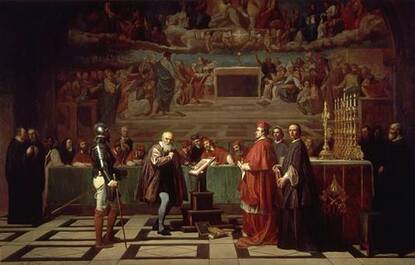 Galileo before the Holy Office, a 19th-century painting by Joseph-Nicolas Robert-Fleury
Galileo before the Holy Office, a 19th-century painting by Joseph-Nicolas Robert-Fleury In 1610, Galileo published his Sidereus Nuncius (Starry Messenger), describing the surprising observations that he had made with the new telescope, among them, the Galilean moons of Jupiter. With these observations and additional observations that followed, such as the phases of Venus, he promoted the heliocentric theory of Nicolaus Copernicus published in De revolutionibus orbium coelestium in 1543. Galileo's discoveries were met with opposition within the Catholic Church, and in 1616 the Inquisition declared heliocentrism to be "formally heretical." Heliocentric books were banned and Galileo was ordered to abstain from holding, teaching or defending heliocentric ideas.
Galileo went on to propose a theory of tides in 1616, and of comets in 1619; he argued that the tides were evidence for the motion of the Earth. In 1632 Galileo published his Dialogue Concerning the Two Chief World Systems, which implicitly defended heliocentrism, and was immensely popular. Responding to mounting controversy over theology, astronomy and philosophy, the Roman Inquisition tried Galileo in 1633 and found him "vehemently suspect of heresy", sentencing him to indefinite imprisonment. Galileo was kept under house arrest until his death in 1642.
In 1758 the Catholic Church dropped the general prohibition of books advocating heliocentrism from the Index of Forbidden Books. It did not, however, explicitly rescind the decisions issued by the Inquisition in its judgement of 1633 against Galileo, or lift the prohibition of uncensored versions of Copernicus's De Revolutionibus or Galileo's Dialogue. The issue finally came to a head in 1820 when the Master of the Sacred Palace (the Church's chief censor), Filippo Anfossi, refused to license a book by a Catholic canon, Giuseppe Settele, because it openly treated heliocentrism as a physical fact. Settele appealed to pope Pius VII. After the matter had been reconsidered by the Congregation of the Index and the Holy Office, Anfossi's decision was overturned. Copernicus's De Revolutionibus and Galileo's Dialogue were then subsequently omitted from the next edition of the Index when it appeared in 1835.
Despite this apparent acquiescence of the Church, however, the controversy has never been officially put to rest. Although Pope John Paul II expressed a desire to see the matter concluded favorably to Galileo and created a Pontifical Interdisciplinary Study Commission in 1981 to study the case, the Commission was not able to reach any definitive result because of the continuing insistence of conservative theologians that Galileo, despite being scientifically accurate, was nonetheless guilty of heresy for challenge the Church's established law.
As recently as 2008, Pope Benedict XVI was forced to cancel a planned visit to La Sapienza University because a majority of the faculty and students protested against Benedict's statement, prior to his election as Pope, that "[t]he Church at the time of Galileo kept much more closely to reason than did Galileo himself, and she took into consideration the ethical and social consequences of Galileo's teaching too. Her verdict against Galileo was rational and just, and the revision of this verdict can be justified only on the grounds of what is politically opportune." The official letter of protest stated that they views of the Pope and others in the Church "offend and humiliate us as scientists who are loyal to reason and as teachers who have dedicated our lives to the advance and dissemination of knowledge."
 RSS Feed
RSS Feed